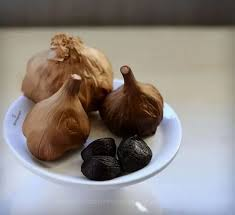If you thought Indian vegetarian food
couldn’t get any more flavorful, think again—black garlic has entered the
scene, and it’s adding a whole new dimension to our beloved dishes. With its
deep, molasses-like sweetness and soft umami richness, black garlic is a
fermented version of regular garlic that’s neither pungent nor overpowering.
Instead, it’s mellow, savory, and unexpectedly luxurious.
While this ingredient has long been
cherished in Korean and Japanese kitchens, it's now slowly finding its way into
Indian vegetarian cooking—and we couldn't be more excited.
Why Black Garlic Works So Well in Indian
Veg Dishes
Indian food already celebrates layers of
flavor: spice, heat, tang, and texture. What black garlic brings is a gentle,
grounding depth, perfectly suited for lentils, vegetables, and grains. It
complements rather than competes with Indian spices, and it adds that elusive
fifth taste—umami—which is rare in purely plant-based ingredients.
Creative Ways to Use Black Garlic in Your
Vegetarian Kitchen
Upgrade Your Dal
Add mashed black garlic to your dal tadka, dal makhani, or panchmel dal for an
earthy sweetness that balances the spices beautifully.
Black Garlic Podi
Ever tried podi with a twist? Blend roasted dals, sesame, chilies, and black
garlic to create a spice mix that’s smoky, sweet, and addictive. Sprinkle over
hot rice with ghee or use as a dry chutney with idlis.
Tadka with a Twist
Sizzle black garlic in oil with mustard seeds, curry leaves, and dried red
chilies. Drizzle over kadhi, kootu, or even plain moong dal to take your tadka
to gourmet heights.
Roasted Veggies & Curries
Make a black garlic paste and toss it with potatoes, carrots, or brinjal before
roasting. Or stir it into a coconut-based curry for a silky, umami-rich finish.
Chutneys and Dips
Blend black garlic with coconut, green chilies, or mint for a surprisingly rich
chutney. You can also make a black garlic yogurt dip—perfect for parathas or
veggie wraps.
Rice, Reimagined
Stir chopped black garlic into your lemon rice or mushroom pulao for an
elevated flavor. Even a simple fried rice with veggies and soy sauce can become
extraordinary.
Paneer & Tofu Love
Marinate paneer or tofu with a mix of black garlic, ginger, cumin, and lemon
juice. Grill or pan-fry for a protein-rich dish that’s anything but ordinary.
Fusion Fare
Black garlic hummus, black garlic naan toast, or even dosa rolls with black
garlic mayo—this ingredient shines in modern desi-western fusion too.
Final Thoughts
Black garlic isn’t just a trend—it’s a
transformative ingredient. Especially for vegetarians looking to deepen flavors
without using heavy cream or loads of oil, it’s a game-changer. The best part?
A little goes a long way. Just a clove or two, mashed into your dish, and
suddenly your everyday meal feels restaurant-worthy.
So next time you're stirring that pot of dal
or roasting a tray of vegetables, reach for black garlic—and experience the
magic of umami in your Indian vegetarian kitchen.










